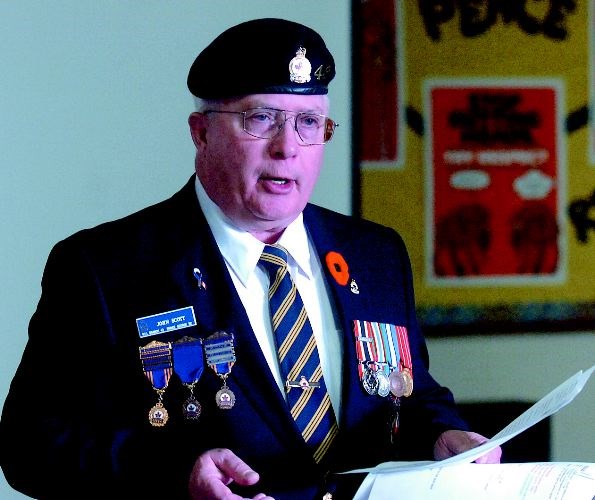Monday was an emotional morning for Prince George veteran John Scott, a Canadian peacekeeper who served 18 years overseas during times that were anxious and uncertain.
He told Sacred Heart school students the time when he began to serve in 1959 is referred to by history as "peace time."
"But soldiers knew different," said Scott.
"What we had was a cold war with the constant fear of nuclear war and knowing we could be called to battle at any moment."
He said serving with NATO "was a very nervous time for us."
"The USSR had 1,000 tanks and many brigades at the East German border prepared for war," said Scott who served in Germany for three years.
"In any such military activity lives are lost - 780 in fact, including 199 Canadians during those peaceful operations."
When one student asked him,'Did you pray?', he answered "Of course. Everyone did."
He said all veterans, those of the two World Wars, the wars that have followed, and veteran peacekeepers like to be recognized and honoured, not only for their accomplishments, but "for what we, as a country, accomplish."
He spoke of the many fallen who've made "the ultimate sacrifice" as well as the wounded and their families
"Veterans only ask that you remember and the families of veterans ask only for you to remember.
"More importantly, find out why this happened by asking questions. Ask, ask, ask and remember what history has taught."
He added that people of today and future generations must never forget the conflicts of the past, and strive to build a future of peace and prosperity.
Scott told students the story of an officer in the German Navy who fully supported the work of his government. After serving in the First World War he became a priest and during the Second World War he took a stand against his own government because of their harsh treatment towards anyone who did not stand with them.
Martin Niemoller was arrested and sent to prison for speaking out, but in his last sermon before the Nazis came for him, he recited a poem that included the following passages:
"When they (Nazis) came for the trade unionists, I did not speak out. I was not a trade unionist."
"When they came for the Jews, I remained silent. I wasn't a Jew."
"When they came for me, there was no one left to speak out."
Scott told students when they wear a poppy, "it is to remember, lead and ask questions."
Following his talk, students were full of queries about his medals, his time of service and any scary times. When asked if he was injured during his service, he answered "nothing serious".
When asked what grenade is the most dangerous, he replied "the one that hits you."
A video of a fallen Canadian soldier being transported along the 401 Highway of Heroes in Ontario was a fitting end to the presentation.
As bagpipes skirled Amazing Grace and a bugler broke the silence with Taps, students witnessed grief-stricken family members and a flag-draped casket being loaded into a black hearse for the soldier's final ride.
At Scott's request, the students in unison said, "We will remember them."



